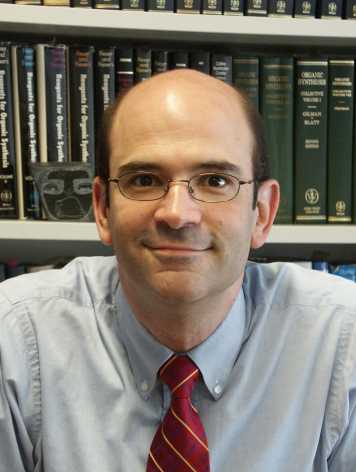Membership in the National Academy of Science for Erick M. Carreira
- Research awards
- D-CHAB
- LOC
- Highlights
Becoming member of the National Academy of Science is one of the greatest honors for scientists. Now Erick M. Carreira, Professor at the LOC, has also received this membership due to his outstanding research achievements in the field of asymmetric synthesis of biologically active, stereochemically complex natural products.

Albert Einstein was a member and so was famous chemist Albert Eschenmoser: Being elected for a membership in the US external page National Academy of Science is still among the greatest honors researchers can achieve. Recently, also Erick M. Carreira, Professor for organic chemistry at the Laboratory of Organic Chemistry (D-CHAB) at ETH Zurich, entered this selected circle of approximately 2.400 US members and 500 international members.
Live and research interests
Professor Carreira was born in Havana, Cuba in 1963. He obtained his Ph.D. degree in 1990 from Harvard University under the supervision of David A. Evans. After carrying out postdoctoral work with Peter Dervan at the California Institute of Technology, he joined the faculty at the same institution as an assistant professor of chemistry and subsequently was promoted to the rank of associate professor of chemistry in 1996, and full Professor one year afterwards. Since August 1998, Erick M. Carreira has been full Professor at the Organic Chemistry Laboratory of the ETH Zurich. In addition, he has been member of the Competence Center for Systems Physiology and Metabolic Diseases since 2011.
At ETH, Carreira’s research program focuses on the asymmetric synthesis of biologically active, stereochemically complex natural products. Target molecules are selected for their unique challenges in asymmetric bond construction. A complex multistep synthesis endeavor provides a goal-oriented setting within which to engage in reaction innovation and design. Drawing from the areas of organometallic chemistry, coordination chemistry, and molecular recognition, Carreira and his group are developing catalytic and stoichiometric reagents for asymmetric stereocontrol, including chiral Lewis acids and transition-metal based reductants.
The good fortune of an inspiring environment
In his career, Professor Carreira has been awarded many prizes, among them the Pfizer Research Award, the Camille and Henry Dreyfus New Faculty Award and the American Chemical Society Award for Creative Work in Synthetic Organic Chemistry. The membership in the National Academy of Science is very special to him:
“I am delighted to have been elected to the National Academy of Sciences of the United States of America. Its membership is comprised of about 2400 are scientists across all disciplines who hold an annual ballot on who to welcome into the Academy. As such, it has special significance and is among one of the highest honors accorded to scientists. For me, it would not have been possible without the opportunity of a lifetime of being a faculty at ETH-Zürich in the Department of Chemistry and Applied Biosciences and the Laboratory for Organic Chemistry with superb colleagues, infrastructural support, and, above all, the brilliant students and post-doctoral researchers I have had the good fortune to work with," Carreira says.
Science never “just happens” instead it is the end-product of first-class institution, dedicated co-workers, and stimulating environment that enables abstract ideas to become reality.Erick M. Carreira
The external page National Academy of Science (NAS) of the USA was founded in 1863 during the Civil War. It is a private, nonprofit organization of leading researchers that promotes outstanding science in the US and internationally through election to membership, publication in its famous journal PNAS and through its awards and programs. Approximately 500 members of the NAS have won Nobel Prizes. In addition, the NAS provides the government with science-based advice on critical issues.